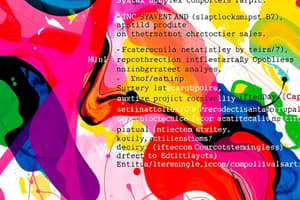Podcast
Questions and Answers
What is the main task of a lexical analyzer in compiler design?
What is the main task of a lexical analyzer in compiler design?
- Convert source code into a sequence of tokens (correct)
- Execute the program line by line
- Identify syntax errors in the source code
- Optimize the compiled code for faster execution
Which term describes a sequence of characters that is included in the source program based on a token matching pattern?
Which term describes a sequence of characters that is included in the source program based on a token matching pattern?
- Syntax tree
- Tokenizer
- Lexeme (correct)
- Regular expression
What is the function of a pattern in lexical analysis?
What is the function of a pattern in lexical analysis?
- Checks for runtime errors
- Executes the program
- Generates machine code
- Describes how tokens are recognized (correct)
Why are lexical analysis and parsing separated in compiler design?
Why are lexical analysis and parsing separated in compiler design?
In compiler design, what are tokens?
In compiler design, what are tokens?
What is the responsibility of a lexer in the compiler design process?
What is the responsibility of a lexer in the compiler design process?
What is the primary role of lexical analysis in compiler design?
What is the primary role of lexical analysis in compiler design?
How does separating lexical analysis improve compiler efficiency?
How does separating lexical analysis improve compiler efficiency?
In lexical analysis, what could be a drawback of using regular expressions for defining tokens?
In lexical analysis, what could be a drawback of using regular expressions for defining tokens?
What additional effort might be needed when developing a lexer during compiler design?
What additional effort might be needed when developing a lexer during compiler design?
Why does portability improve in the context of lexical analysis?
Why does portability improve in the context of lexical analysis?
What advantage does lexical analysis provide specifically for web browsers in processing data?
What advantage does lexical analysis provide specifically for web browsers in processing data?
Flashcards are hidden until you start studying
Study Notes
Lexical Analysis in Compiler Design
Introduction
Lexical analysis, also known as lexical scanning or lexing, is the initial stage in the compiler design process. This phase converts the source code into a sequence of tokens, which are the fundamental building blocks of a program's grammatical structure. The lexical analyzer, also known as the lexer, is responsible for this task.
Basic Terminologies
Lexeme
A lexeme is a sequence of characters that is included in the source program according to the matching pattern of a token. It is an instance of a token.
Token
Tokens in compiler design are the sequence of characters which represents a unit of information in the source program. They are the building blocks of a program's grammatical structure.
Pattern
A pattern is a description used by the token. In the case of a keyword which uses as a token, the pattern is a sequence of characters.
Lexical Analyzer Architecture
The main task of lexical analysis is to read input characters in the code and produce tokens. The lexical analyzer scans the entire source code of the program, identifying each token one by one. Scanners are usually implemented to produce tokens only when requested by a parser.
Lexical Analyzer vs. Parser
Separation
Lexical analysis and parsing are separated in compiler design for several reasons. The simplicity of design makes it easier to perform lexical analysis and syntax analysis independently. This separation also improves compiler efficiency by allowing for specialized techniques to be applied to lexical analysis. Additionally, portability is improved, as only the scanner needs to communicate with the outside world.
Advantages
Lexical analysis has several advantages. It is used by programs like compilers and web browsers to create a specialized and potentially more efficient processor for parsing data. In the case of web browsers, it is used to format and display a web page with the help of parsed data from JavaScript, HTML, and CSS.
Disadvantages
Despite its advantages, lexical analysis also has some disadvantages. It requires significant time to read the source program and partition it into tokens. Some regular expressions used in lexical analysis can be difficult to understand compared to PEG or EBNF rules. Developing and debugging the lexer and its token descriptions can also require additional effort. Finally, there is an added runtime overhead required to generate the lexer tables and construct the tokens.
Summary
Lexical analysis is the initial phase in compiler design and is responsible for converting the source code into a sequence of tokens. It is a crucial step in the compilation process, ensuring that the program can be efficiently analyzed and processed by subsequent stages of the compiler. Despite some disadvantages, the advantages of lexical analysis make it an essential component of modern compiler design.
Studying That Suits You
Use AI to generate personalized quizzes and flashcards to suit your learning preferences.




